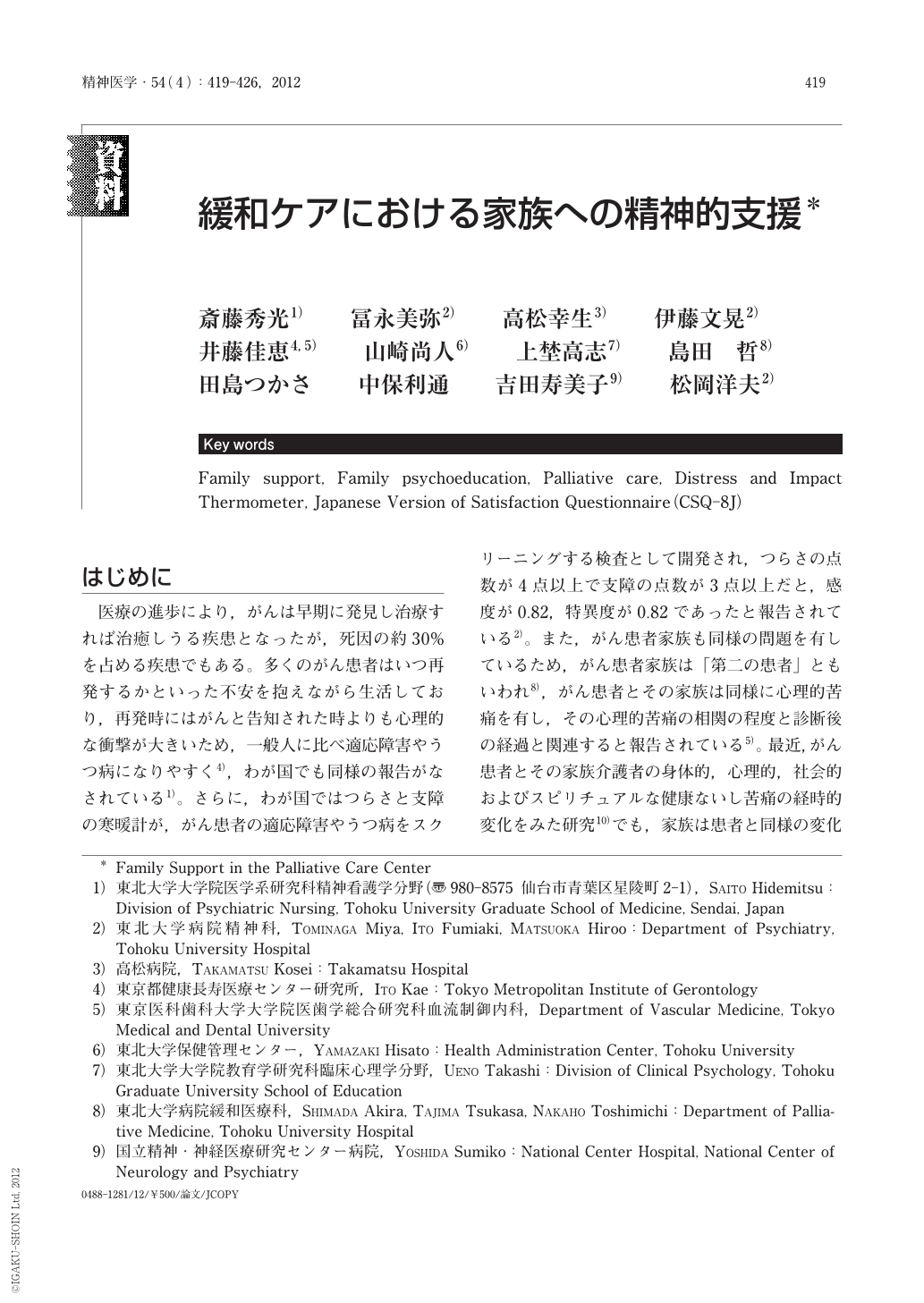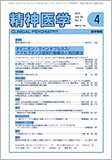Japanese
English
- 有料閲覧
- Abstract 文献概要
- 1ページ目 Look Inside
- 参考文献 Reference
はじめに
医療の進歩により,がんは早期に発見し治療すれば治癒しうる疾患となったが,死因の約30%を占める疾患でもある。多くのがん患者はいつ再発するかといった不安を抱えながら生活しており,再発時にはがんと告知された時よりも心理的な衝撃が大きいため,一般人に比べ適応障害やうつ病になりやすく4),わが国でも同様の報告がなされている1)。さらに,わが国ではつらさと支障の寒暖計が,がん患者の適応障害やうつ病をスクリーニングする検査として開発され,つらさの点数が4点以上で支障の点数が3点以上だと,感度が0.82,特異度が0.82であったと報告されている2)。また,がん患者家族も同様の問題を有しているため,がん患者家族は「第二の患者」ともいわれ8),がん患者とその家族は同様に心理的苦痛を有し,その心理的苦痛の相関の程度と診断後の経過と関連すると報告されている5)。最近,がん患者とその家族介護者の身体的,心理的,社会的およびスピリチュアルな健康ないし苦痛の経時的変化をみた研究10)でも,家族は患者と同様の変化をとり,特に家族介護者の心理的,スピリチュアルな苦痛が,患者本人の苦痛をよく反映していると報告されている。また,がん患者家族は,患者の介護の他に,家事,育児や親の介護の問題,仕事などの日常生活上での負担なども抱え,ターミナル期の中期以降には介護疲れが出やすく,介護をした配偶者の40%弱が抑うつ症状を呈していたと報告されている3)。しかしながら,わが国での緩和ケア病棟やホスピスでの家族支援は,患者が死亡後のグリーフケアが主で,入院中の患者家族を対象にして精神的支援が行われていないのが現状である。
我々は2005年2月より東北大学病院緩和ケアセンターを主に複数の診療科を対象にしてコンサルテーション・リエゾンサービス(以下,CLS)を行っている。そこで,緩和ケアセンターに入院した患者の家族の負担軽減を図るために,2007年7月に緩和ケアセンター入院患者家族および死亡退院患者家族に対して,家族が入院前と入院後に困ったことの有無,患者の身体および心の変化や家族の心の変化についての一般的知識に関する勉強会への参加の有無などについての質問紙調査を実施した。それを踏まえて「緩和ケア病棟に入院されたご家族のために」という家族心理教育用の小冊子を作成した。2009年4月より,家族の精神的支援の有用性を検討するために,「家族教室」との名称を用いた家族心理教育を実施し,本研究を行った。
We carried out family psychoeducation to determine whether psychological support for family members of patients with cancer was effective in supporting their mental health. The subjects were 45 family members of patients with cancer who participated in family psychoeducation. The family psychoeducation consisted of two sessions. After the first session, we examined the Distress and Impact Thermometer, which was a brief screening tool for detection of adjustment disorders and/or major depression. We also asked them for comments in the free description about their "having trouble now" and their "requests to consult with someone regarding other problems." After the second session, we examined the Distress and Impact Thermometer and the Japanese Version of the Client Satisfaction Questionnaire which consists of 8 items (CSQ-8J). We also asked them to give in the free description their "thoughts or opinion on the booklet" and their "thoughts or opinion on the family psychoeducation." In the Distress and Impact Thermometer, both the distress score and impact score of the family members were higher than their cutoff points for detection of adjustment disorders and/or major depression, respectively. It was suggested that the family members carried a large burden. From the high average total score of the CSQ-8J and the results of the free descriptions, it was suggested that the family psychoeducation was useful.

Copyright © 2012, Igaku-Shoin Ltd. All rights reserved.


